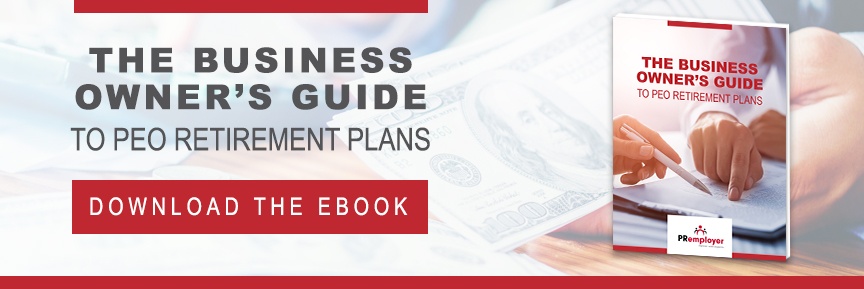
Employees want to receive fair and competitive pay. That's number one. But a close second to what they want employers to offer them is a stellar benefits package. That includes retirement plans.
Because some retirement plans rely on employment, employees can only access plans like a 401(k) by working for a company that offers this benefit. Turnover can be especially harmful and costly to small businesses, but you can combat this by offering your employees a competitive benefits package that puts you above your competition.
Retirement Plan Options for Small Businesses
Massive corporations have more capacity for administering retirement plans. They have more room to shoulder some administrative costs and the time burden of offering these plans to employees.
Small businesses can offer employee benefits, too. An Individual Retirement Account (IRA) is a retirement plan that an individual can set up independently. Many don't. By setting one up for your entire company, you can give every employee access to an IRA, allowing them to save for retirement. Specifically designed for small businesses, a version of an IRA called a Simplified Employee Pension Plan (SEP) lets your business contribute to a traditional IRA for your employees.
You may have also heard of a solo 401(k), an individual retirement plan designed for a business owner with no employees. IRS rules don't allow you to have a solo 401(k) if you have employees, though you can make contributions for a spouse. Once your small business grows beyond just you, you can offer your employees a regular 401(k), giving them another vehicle to save for retirement. You can also entice new employees to join your team by offering a matching contribution on funds employees make up to a certain amount.
 You Can Claim Tax Credits with 401(k)
You Can Claim Tax Credits with 401(k)
.png?width=200&name=premployer%20(33).png) Retirement plans have built-in tax reduction measures to incentivize companies to use them. 401(k) contributions your employees make to their traditional 401(k) reduce their taxable income. Traditional 401(k) contributions go into their retirement account pre-tax and are taxed when they take distributions in retirement. Contributions they make to their Roth 401(k), if you offer it, are made after-tax, so the benefit to the employee is that the money grows tax-free, and there's no tax when they take it out in retirement.
Retirement plans have built-in tax reduction measures to incentivize companies to use them. 401(k) contributions your employees make to their traditional 401(k) reduce their taxable income. Traditional 401(k) contributions go into their retirement account pre-tax and are taxed when they take distributions in retirement. Contributions they make to their Roth 401(k), if you offer it, are made after-tax, so the benefit to the employee is that the money grows tax-free, and there's no tax when they take it out in retirement.
But there's a benefit for you, too. If you make a matching contribution to your employees' traditional 401(k) - you cannot match contributions to a Roth - that money is tax-deductible for your business. That helps reduce your company tax liability while also providing an incentive for employees to join and stick with your company.
However, as businesses get larger, management and owners must take more responsibility for their employees’ retirement, called the 401(k) Fiduciary Liability. Additionally, when businesses reach 100 or more employees, they must have an annual audit of their 401k plan, which can cost upwards of $15,000 per year. They will also need to form a committee that meets several times per year to make decisions on behalf of the participants.
Adjust Your Plans Every Year
You must be careful and strategic about where your money goes and what fees you incur to get the most out of your company's retirement accounts. Designing an employee benefits program that saves you money requires that you take proactive steps to ensure you're getting the most bang for your buck.
Being strategic about your employee retirement plans can help you maximize your cost savings. Using both pre-tax and post-tax income enables you to get the most return on your investment.
Reviewing your plans every year ensures that you are compliant with regulations surrounding retirement accounts. It also helps you make adjustments as your company grows. Maybe you need to increase your company match for your employees' 401(k) plans or add a Roth 401(k) to the mix. Maybe your company has grown so much that you need someone to help guide you and administer your retirement plans.
Get Help with Your Retirement Plans from a PEO
.png?width=200&name=premployer%20(34).png) A Professional Employer Organization (PEO) is a company that provides your small business with outsourced HR services and support. It's all-encompassing but not meant to replace any of your internal HR team members. Instead, a PEO serves to compliment your HR staff, taking on the complex and mundane tasks of administering your retirement plans and handling payroll, among many other items.
A Professional Employer Organization (PEO) is a company that provides your small business with outsourced HR services and support. It's all-encompassing but not meant to replace any of your internal HR team members. Instead, a PEO serves to compliment your HR staff, taking on the complex and mundane tasks of administering your retirement plans and handling payroll, among many other items.
A good PEO can even help you set up your retirement plan, helping you grow quickly and sustainably. PEOs can offer you access to their retirement plan options, negotiated at scale by experts. They give you access to high-quality retirement plan options at costs your company can afford.
Finding a retirement plan that works for your employees and within your small business budget can be a daunting task. You can shed this task by partnering with a PEO who can guide you through the entire process, including the ongoing need of administering your plan and ensuring compliance every step of the way. That gives you and your internal HR staff the time to focus on putting more effort into building a company culture that attracts new employees and supports your existing team members.
The Right PEO is Just a Call Away
Making the step to add a retirement plan to your company's benefits package is a big one. And it's a good sign that you're doing something right, moving your company forward. But finding a plan and, even more importantly, administering the program within the compliance boundaries will require lots of effort, focus, and knowledge. You can rely on one internal HR employee to do this, you can do this, or you can choose instead to partner with a PEO who has years of experience doing exactly this type of work.

